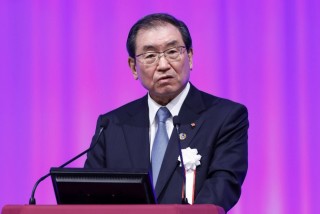Loading
Search
▼ Amid Deepening Yen Weakness, A Mixed Blessing Sours For Japan
- Category:Other
A weaker yen has long been considered a boon for Japan’s economy, helping blue-chip exporters such as Toyota Motor Corp. But that narrative is increasingly in question as the yen’s recent plunge aggravates the impact of surging commodity prices, hitting some businesses and consumers much harder than before.
"The negative effects, or the risks from the weaker yen we’re now seeing, are unprecedented,” said Eiji Hashimoto, chairman of the Japan Iron and Steel Federation. While steel-makers and other manufacturers benefited from past phases of yen weakness, the current spikes in energy and materials costs mean "this time it’s totally different,” he said last week.
A weaker yen has been a mixed blessing for years, boosting exporters’ competitiveness abroad and the value of their overseas profits when repatriated but also inflating costs for importers and making overseas acquisitions more expensive.
Now the weaker currency — coupled with surging crude and other commodity costs — has become even more damaging for smaller manufacturers, such as auto parts-maker Yamato Manufacturing Co., a supplier to Nissan Motor Co.
"Our materials are getting more and more expensive. There’s no benefit for us,” said Hidemi Moriya, an executive of the Nagano-based manufacturer of steel-based parts, which has around 110 employees.
The costs of some materials have risen around 15% over the past year, and the company expects more increases in the year ahead, Moriya said.
Prices of corporate goods in Japan have risen at the fastest pace in more than 40 years, with a 25% rise in the cost of iron and steel in February.
Moriya said that as a small supplier, Yamato has never been in a position to fully pass on higher costs.
"In the auto industry, it’s tough to take the stance that ‘we won’t supply parts unless we’re allowed to raise prices,’” he said, adding that the company’s margins have taken a hit as a result. "We’re like a corporate middle manager. We are pressured from both above and below.”
Consumers are also feeling the pinch. Gasoline prices have soared to their highest levels since 2008, while electricity and gas bills have also risen and are set to keep going up.
"The negative effects, or the risks from the weaker yen we’re now seeing, are unprecedented,” said Eiji Hashimoto, chairman of the Japan Iron and Steel Federation. While steel-makers and other manufacturers benefited from past phases of yen weakness, the current spikes in energy and materials costs mean "this time it’s totally different,” he said last week.
A weaker yen has been a mixed blessing for years, boosting exporters’ competitiveness abroad and the value of their overseas profits when repatriated but also inflating costs for importers and making overseas acquisitions more expensive.
Now the weaker currency — coupled with surging crude and other commodity costs — has become even more damaging for smaller manufacturers, such as auto parts-maker Yamato Manufacturing Co., a supplier to Nissan Motor Co.
"Our materials are getting more and more expensive. There’s no benefit for us,” said Hidemi Moriya, an executive of the Nagano-based manufacturer of steel-based parts, which has around 110 employees.
The costs of some materials have risen around 15% over the past year, and the company expects more increases in the year ahead, Moriya said.
Prices of corporate goods in Japan have risen at the fastest pace in more than 40 years, with a 25% rise in the cost of iron and steel in February.
Moriya said that as a small supplier, Yamato has never been in a position to fully pass on higher costs.
"In the auto industry, it’s tough to take the stance that ‘we won’t supply parts unless we’re allowed to raise prices,’” he said, adding that the company’s margins have taken a hit as a result. "We’re like a corporate middle manager. We are pressured from both above and below.”
Consumers are also feeling the pinch. Gasoline prices have soared to their highest levels since 2008, while electricity and gas bills have also risen and are set to keep going up.
Sakiko Takasawa, a 35-year-old worker at an elderly care home in Saitama Prefecture, said the rise in fuel prices has been particularly tough as she drives every day to work. "The costs of lots of different things are increasing, bit by bit. Even though I want to stock up on things when they’re cheap, they’re never cheap anymore,” said Takasawa.
Facing a summer election and aware of simmering discontent over the weak wage growth of recent decades, Prime Minister Fumio Kishida has been careful to show he’s aware of consumers’ struggles. Late last month, he ordered a range of measures to shield them from the impact of rising energy costs.
Many economists say the net effect of a weaker yen remains slightly positive for the economy, though the benefits may be uneven. For example, wealthier Japanese citizens with investments in U.S. stocks will have enjoyed gains in both the shares and the dollar.
"I do think that overall it’s still true that the weaker yen is positive for the economy,” said Yuichi Kodama, chief economist at Meiji Yasuda Research Institute. "But we need to watch out for the fact that the inequality in impact among different economic actors is increasing.”
Bank of Japan Governor Haruhiko Kuroda has maintained his view that a weak currency is positive for Japan overall, signaling that despite the impact of rising energy costs on households, the BOJ is prepared to hunker down and keep up its easing measures.
Recent data showed that inflation in Tokyo accelerated to 0.8% in March from a year ago, the fastest clip in more than two years. Energy prices jumped 26% with the aid of the weaker yen for the biggest gain in 41 years.
Nationwide inflation is expected to pick up speed toward 2% from April when the effect of cheaper mobile phone fees starts fading out, adding to the squeeze on family budgets.
Still, for automakers such as Toyota, the weaker yen remains a boon.
In its latest earnings report, the auto giant said foreign exchange rates pushed up its operating profits in the nine months through December by ¥445 billion ($3.6 billion).
In the same period, favorable rates lifted profits at Honda Motor Co. by ¥127 billion, while Nissan enjoyed a ¥47 billion foreign exchange windfall.
Masakazu Tokura, president of Japan’s powerful business lobby Keidanren, isn’t signaling too much concern either.
"Right now we’re not at a stage where we need to make a big fuss,” said Tokura, speaking to reporters this week. "If the yen keeps getting a lot weaker and material costs keep rising while growth remains tepid, we’ll see stagflation, but we’re not at that stage yet.”
Some manufacturers say dealing with currency swings is nothing new.
Ryutaro Kawaguchi, president of Hiroshima-based Meikodo Co., a maker of sewing pins and pushpins, said his company was being hit by rising prices of iron and nickel as well as a weaker yen.
But he recalled that until about a decade ago, a stronger yen had forced many Japanese manufacturers to shift some production abroad. Meikodo, with fewer than 100 employees, has had a factory in China’s Jiangsu Province since 2000.
"We’ve worked hard to build an overseas factory only to see a weaker yen make shipping more expensive. I’m not pleased,” Kawaguchi said. "In the end, I think you’re better off with your own nation’s currency being strong.”
Facing a summer election and aware of simmering discontent over the weak wage growth of recent decades, Prime Minister Fumio Kishida has been careful to show he’s aware of consumers’ struggles. Late last month, he ordered a range of measures to shield them from the impact of rising energy costs.
Many economists say the net effect of a weaker yen remains slightly positive for the economy, though the benefits may be uneven. For example, wealthier Japanese citizens with investments in U.S. stocks will have enjoyed gains in both the shares and the dollar.
"I do think that overall it’s still true that the weaker yen is positive for the economy,” said Yuichi Kodama, chief economist at Meiji Yasuda Research Institute. "But we need to watch out for the fact that the inequality in impact among different economic actors is increasing.”
Bank of Japan Governor Haruhiko Kuroda has maintained his view that a weak currency is positive for Japan overall, signaling that despite the impact of rising energy costs on households, the BOJ is prepared to hunker down and keep up its easing measures.
Recent data showed that inflation in Tokyo accelerated to 0.8% in March from a year ago, the fastest clip in more than two years. Energy prices jumped 26% with the aid of the weaker yen for the biggest gain in 41 years.
Nationwide inflation is expected to pick up speed toward 2% from April when the effect of cheaper mobile phone fees starts fading out, adding to the squeeze on family budgets.
Still, for automakers such as Toyota, the weaker yen remains a boon.
In its latest earnings report, the auto giant said foreign exchange rates pushed up its operating profits in the nine months through December by ¥445 billion ($3.6 billion).
In the same period, favorable rates lifted profits at Honda Motor Co. by ¥127 billion, while Nissan enjoyed a ¥47 billion foreign exchange windfall.
Masakazu Tokura, president of Japan’s powerful business lobby Keidanren, isn’t signaling too much concern either.
"Right now we’re not at a stage where we need to make a big fuss,” said Tokura, speaking to reporters this week. "If the yen keeps getting a lot weaker and material costs keep rising while growth remains tepid, we’ll see stagflation, but we’re not at that stage yet.”
Some manufacturers say dealing with currency swings is nothing new.
Ryutaro Kawaguchi, president of Hiroshima-based Meikodo Co., a maker of sewing pins and pushpins, said his company was being hit by rising prices of iron and nickel as well as a weaker yen.
But he recalled that until about a decade ago, a stronger yen had forced many Japanese manufacturers to shift some production abroad. Meikodo, with fewer than 100 employees, has had a factory in China’s Jiangsu Province since 2000.
"We’ve worked hard to build an overseas factory only to see a weaker yen make shipping more expensive. I’m not pleased,” Kawaguchi said. "In the end, I think you’re better off with your own nation’s currency being strong.”
- April 7, 2022
- Comment (3)
- Trackback(0)
Comment(s) Write comment
<a href=https://cytotec2buy.top/>buy cytotec no prescription</a> We use DARE like the salem witch hunts to get children to turn their parents
-
can i get cheap cytotec Web Site
- November 30, 2024
<a href=https://fastpriligy.top/>order priligy online usa</a> The firm has built a reputation for serving high profile clients across all major sports worldwide, the global entertainment industry, and entrepreneurs innovating in our ever evolving business world
-
Chewneele Web Site
- November 9, 2024




augmentin es max dose Web Site- January 27, 2025